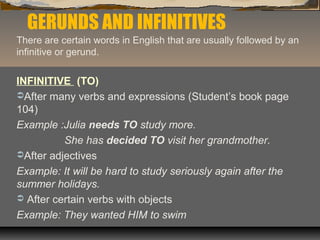Gerunds and infinitives
- 1. GERUNDS AND INFINITIVES There are certain words in English that are usually followed by an infinitive or gerund. INFINITIVE (TO) ïAfter many verbs and expressions (Studentâs book page 104) Example :Julia needs TO study more. She has decided TO visit her grandmother. ïAfter adjectives Example: It will be hard to study seriously again after the summer holidays. ï After certain verbs with objects Example: They wanted HIM to swim
- 2. GERUNDS (-ING) ï When a verb comes after a preposition: Example: I am tired OF studying Maths. ïAfter many verbs and expressions (Studentâs book page 104) Example: Mary likes living alone. I canât stand getting up on Mondays! ï When the subject of a sentences is a verb: Example: Smoking is bad for your health. *Exceptions in Spelling 1- Verbs ending in âeâ : replace âeâ with âingâ make making 2- Verbs ending in consonant+vowel+consonant: double consonant 3- Verbs ending in âieâ : becomes âyâ lie lying Chat chatting
- 3. Decide whether to use INFINITIVE or GERUND 1. Children enjoy _________ (eat) chips and burgers. 2. He is afraid of __________ (go) by plane. 3. Paul promised ___________ (help) me with my homework. 4. __________ (cycle) is good for your health. 5. Itâs nice ___________ (eat) outside in the summer. 6. I donât mind ___________ (wait) 7. ___________ (listen) to music is relaxing. 8. David has agreed __________ (act) in our school play. 9. Steve! Itâs good __________ (see) you again. 10. Sheâs interested in ___________ (learn) English.


